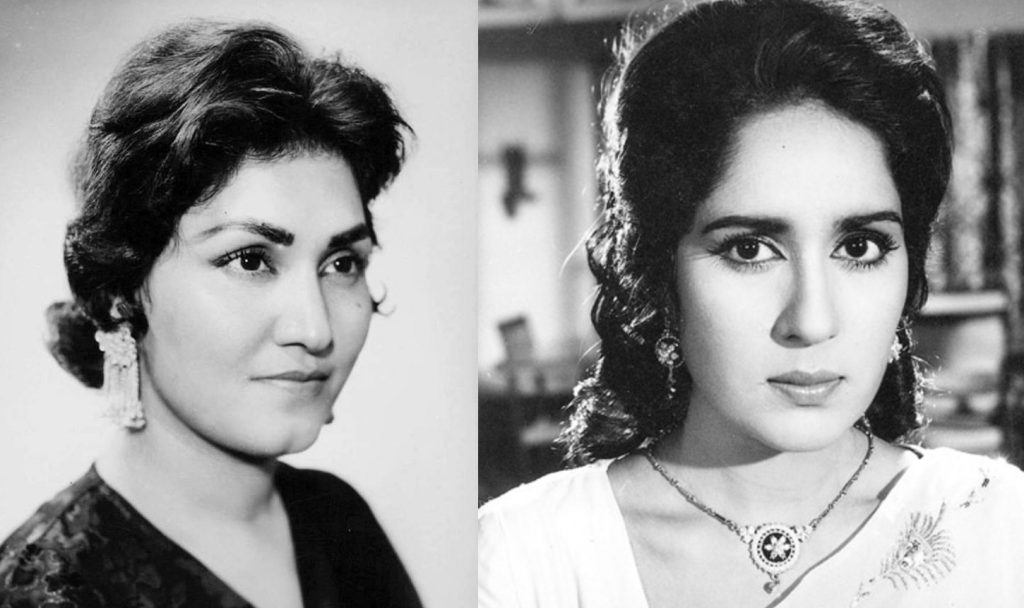Noor Jehan officially turned ‘playback singer’ in Pakistan beginning with the song Zindagi Hai Ya Kisika Intezar filmed on actress Bahar for the film Salma (1960). The song was composed by Rashid Attre for whom she had earlier sung as a singing star in the films Anaarkali (1958) and Neend (1959). She had, however, lent her voice for other actresses earlier on a couple of occasions for instance, in her first husband, Shaukat Hussain Rizvi’s film, Jan-e-Bahar (1958), she gave her voice for Musarrat Nazir. But then Noor Jehan was the original heroine of the film and the songs were actually recorded to be filmed on her but differences with Rizvi saw her leave the film. She, however, let him use the songs already recorded. She also sang a song in Neend, Kyon Udhas Ho Rahe Ho, filmed on dancer-actress Rakshi. With a final performance as a leading lady in Ghalib (1961), Noor Jehan the singer took over from Noor Jehan the actress-singer. In no time, she along with Naseem Begum, became the most popular singer in the country.
The 1960s also saw the rise of actress Shamim Ara. Having made her debut in Kunwari Bewa (1956), followed by supporting roles in Miss 56 (1956) and Anaarkali (1958), Ara broke through big time with SM Yusuf’s Saheli (1960). Though Nayyar Sultana played the lead, Ara more than left her mark in the super hit film. From then on, she entered the A-1 category and quickly rose to become the top actress of Pakistan by the end of the decade, taking over from the ‘First Lady’ of the Pakistan screen, Sabiha Khanum, who ruled in the 1950s and early ’60s. As Ara rose to the peak, it was but natural for the top actress of the country to be voiced by the ‘Mallika-e-Tarannum’ herself in a series of films.
Here we look at some of the best songs sung by Noor Jehan for Shamim Ara.
Thinking of the Noor Jehan and Shamim Ara combo, the first song that immediately comes to mind is Faiz Ahmed Faiz’s immortal poem, Mujhse Pehli Si Mohabbat Mere Mehboob Na Maang, composed by Rashid Attre from the film Qaidi (1962), where Ara co-stars opposite Darpan. The song proved to be a most memorable one for all those associated with it and when Noor Jehan visited India in 1982, 35 years after she opted to make Pakistan her home, it was one of the three songs she chose to sing at the Mortal Men, Immortal Melodies function in Bombay, celebrating 50 years of the Indian Talkie.
The next song featuring the two is this beautiful romantic ditty from Chingari (1964), a film that explores the effects of sinful Western modernism (drinking alcohol and doing the twist!) on traditional Pakistani society. There was always something special for listeners to savor whenever Khwaja Khurshid Anwar composed for the Melody Queen and Chingari proved no different.
Aag Ka Dariya (1966), is featured loosely on Sunil Dutt’s production, Mujhe Jeene Do (1963), which starred Dutt as a dacoit and Waheeda Rehman as a dancing girl. This adaptation sees Ara play the dancing girl while Mohammad Ali plays the dacoit. Both men would win Best Actor awards for the film. Dutt, the Filmfare Award and Ali, the Nigar Award. Aag Ka Dariya marked that rare occasion when the great poet Josh Malihabidi wrote for the cinema, penning some extremely evocative lyrics for the film including this gem which you can hear and see here.
Lakhon Mein Aik (1967) sees Ara play a Hindu girl who falls for a Muslim boy (Ejaz Durrani) from Pakistan but is forced to marry a Hindu BSF officer (Mustafa Qureshi) in India. This Indo-Pak love story, scripted by Zia Sarhadi, is regarded by Pakistani critics and film historians as one of the best and most balanced films to come out of Pakistan and said to be the inspiration for Raj Kapoor’s Henna (1991). Anyone seeing the film from the Indian side would not agree and find the film unabashedly biased. However, no one either side of the border can deny that the highlight of the film is its fantastic musical score wonderfully composed by Nisar Bazmi with Noor Jehan at her melodic best.
And now one from Salgirah (1969) that stars Shamim Ara with Waheed Murad. Salgirah sees Ara in fine form as a woman who was separated from her parents when as a little girl, she stepped out of a temporary halted train to get her doll that had fallen out only to have the train start and leave alone without her. She becomes a well-known radio singer, Shabana, and events take a dramatic turn when she is arrested and tried for murder only to be acquitted. And of course, happily reunited with her family. Here is a lovely melody that Shabana sings at the radio station. The song’s beginning words, Meri Zindagi Hai Nagma Meri Zindagi Tarana, could well be a reflection of Noor Jehan’s own musical philosophy. It is a beautiful composition by Nashad.
Finally, we end with another lovely song featuring Noor Jehan and Shamim Ara in combination, this time from Bewafa (1970), again with Waheed Murad as her co-star.


